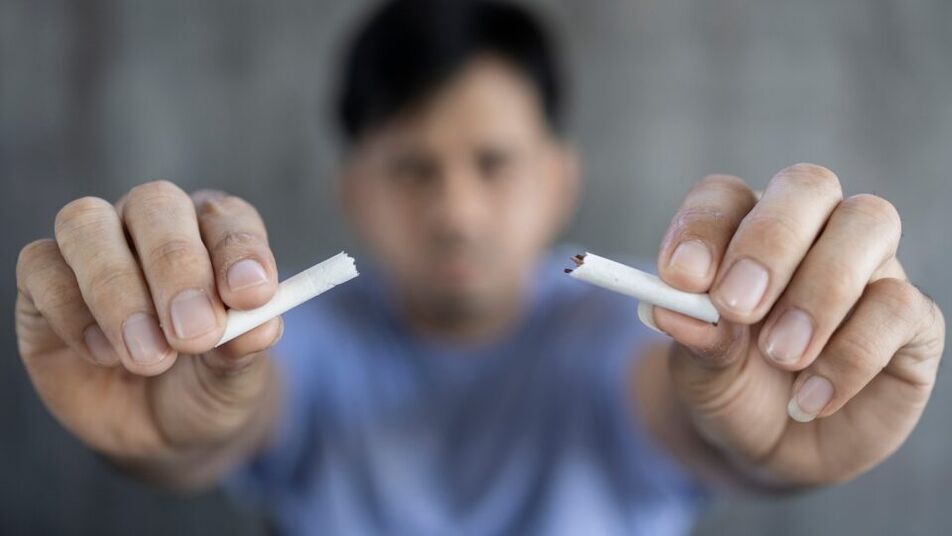
What is nicotine addiction
"Stimulate»
"cigarette game»
"relaxation»
"support"
"Thirsty»
"reflection»
- Phase 1 - Initial phase. Smokers occasionally smoke out of psychological dependence. No physical dependence was observed during this phase.
- The second stage is characterized by initial manifestations of physical dependence on nicotine.
- The third stage combines the obvious elements of psychological and physical dependence on nicotine.
- Do you smoke more than one pack of cigarettes a day?
- Do you feel like smoking within half an hour of getting up?
- When you quit smoking, did you have a strong urge to smoke again and suffer from "withdrawal symptoms"?
Interesting facts about smoking
| facts about smoking | describe |
|---|---|
| Number of smokers in the world (World Health Organization) | 1 billion people |
| Percentage of smokers by gender | 40% of all men, 9% of all women |
| In which countries is smoking more common? | Kiribati, Montenegro, Greece, Timor |
| In which countries is smoking less common? | Ghana, Ethiopia, Nigeria, Eritrea, Panama |
| diseases caused by smoking | Baldness, cataracts, early wrinkles, hearing loss, skin cancer, tooth decay, emphysema, osteoporosis, heart disease, gastric ulcer, miscarriage, spermatogenesis disorders, psoriasis, thrombo-obliterative disease, cancer of more than 15 types of organs |
| Annual mortality due to smoking (World Health Organization) | More than 7 million people (1. 5 million of them women) – one every 6. 5 seconds |
| Annual mortality from exposure to SHS (second-hand smoke) (World Health Organization) | 1. 2 million people (64% women, approximately 65, 000 children) |
| Popular Myths About Smoking |
|
5 best ways to quit smoking
1. Drugs
Medications without nicotine
- The treatment period of ANR is several times shorter than that of NWP; the drug does not need to be discontinued gradually; the treatment effect is good.
- Available by prescription; has complex dosing regimen; many contraindications; do not use under 18 years of age, pregnant, or breastfeeding.
nicotine replacement drugs
- Eases withdrawal symptoms; suitable for people who do not want to quit smoking completely; minimal number of contraindications.
- Consult a doctor before use; cannot be used under 18 years of age, pregnant or lactating.
2. Psychotherapy

- The treatment effect is significant; enhances the effect of drug treatment; only requires 2-3 courses.
- Highly qualified specialists are required; depends on patient motivation.
3. Acupuncture
- No medication is required; the course of treatment is short; there are no contraindications or side effects;
- High patient motivation is required; you can only trust highly qualified specialists.
4. Doctor consultation

- Consulting a doctor can improve the effectiveness of any treatment; if you are highly motivated, you can get it done without the use of drugs.
- Only weak levels of dependence can be helped; quitting requires a high degree of motivation.
5. Behavioral therapy
- Decide whether to quit smoking immediately or gradually. If not immediately, make a plan to gradually reduce the number of cigarettes you smoke.
- If you decide to quit smoking immediately, set a date in advance. Try to time it around events that are important to you. On the eve of the day, smoke twice a day to saturate your body with nicotine.
- If you regularly smoke at work, schedule your quitting sessions during holidays or weekends. Try to find a quit smoking buddy.
- When gradually quitting smoking, try to avoid smoking after sleeping and eating. Keep cigarettes, lighters and ashtrays out of your sight. Try not to smoke in front of children, relatives and in society. Frequently go to places where smoking is prohibited.
- Don't buy cigarettes in advance and try to smoke only half a cigarette.
- If you have the urge to smoke, don't do it right away. Intense craving to smoke lasts 3-5 minutes. Before that, do some exercise or take a walk.
- Try quitting smoking regularly for a period of time: half a day, a day, a few days, etc.
- Go to Gym. Active physical activity can increase the production of happy hormones and reduce withdrawal symptoms.
Doctor's advice to people who want to quit smoking
Popular questions and answers
- Why is it so hard to quit smoking?
Nicotine addiction affects all areas of the human body: mental, emotional, and physical. In terms of the strength of attachment, doctors compare it to alcohol and drug addiction. When you quit smoking, "withdrawal syndrome" occurs. Relieving these symptoms is the most difficult task. Treatment requires a long-term, comprehensive, and professional approach. - Is it okay to quit smoking suddenly?
With a clear motivation, this approach to problem solving will be most effective. If you have a strong addiction, doctors recommend that you quit smoking immediately. Nicotine replacement therapy or nicotinic blockers will help relieve withdrawal symptoms. - How is the process of quitting smoking?
When you quit smoking for days or even months, symptoms of the so-called "withdrawal syndrome" can appear: cravings for cigarettes, anxiety, decreased concentration, restlessness and irritability, weakness, malaise, and discomfort. Physical symptoms such as cough and insomnia worsened. - When will the desire to smoke disappear?
The strongest desire to smoke will occur within a week. Subsequently, the desire to smoke subsides, but may persist for one to several months. Doctors consider a quit attempt successful if the patient does not smoke for six months. - Is it okay to smoke occasionally?
There is no "safe" level of smoking. According to statistics, if a person smokes just one cigarette a day, the chance of suffering from heart disease or stroke will increase by 30-50%. Every "occasional cigarette" can re-addict a former smoker. - Why do people gain weight after quitting smoking?
The main cause of weight gain is "stress eating". When quitting smoking, people often snack instead of taking smoking breaks, which can lead to weight gain. Sometimes, the endocrine system is disrupted when smoking, leading to weight loss. After you quit smoking, your weight may return to your previous level.























